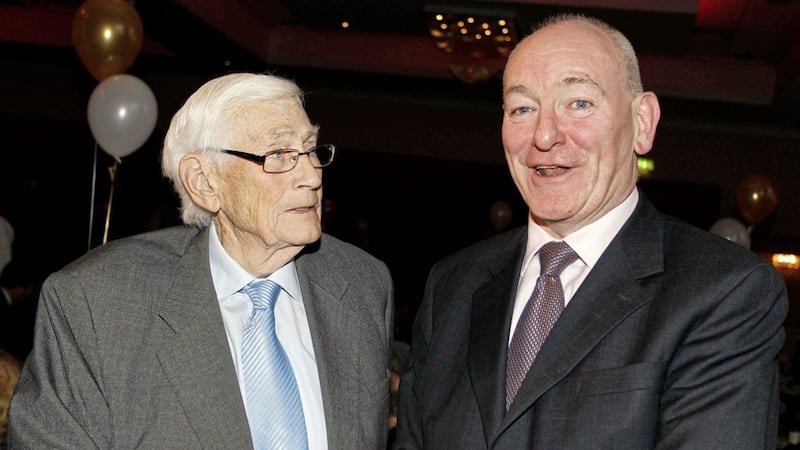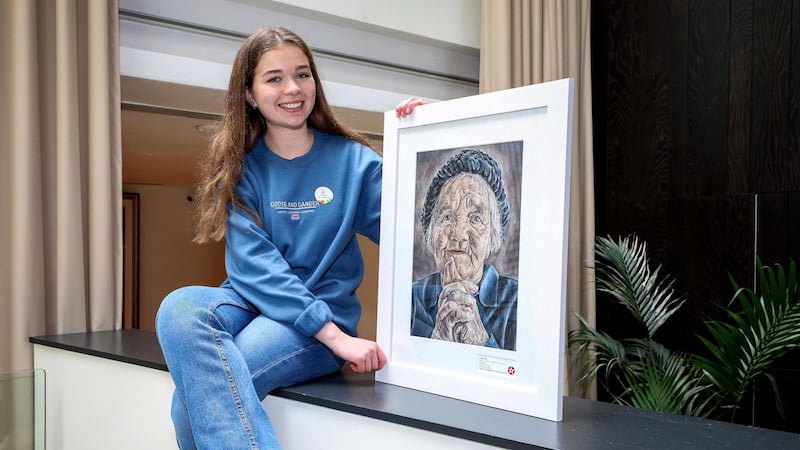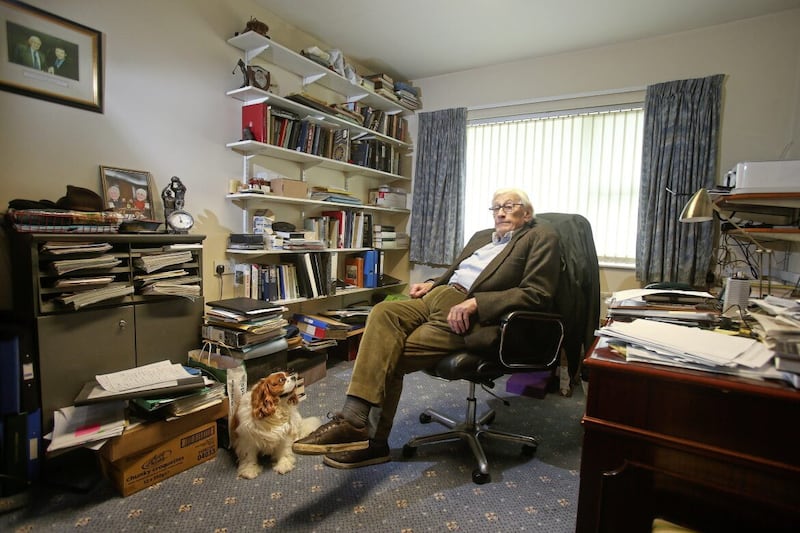Seamus Mallon would probably lapse into sardonic whimsy about many of the fine, genuine and deserved tributes paid on his death.
There would be guttural muttering about being spared "the creeping Jesus" stuff. ("Creeping Jesuses" seemed to be a worryingly increasing demographic in his eyes at stages).
But the listening Seamus would also take some pride in the appreciations offered.
Not so much for what they rightly say about his personal character and contribution but what they tell us about the changed political environment that he did so much to achieve.
It has become cliched for politicians to speak of the motivation to make a difference.
There was compelling sincerity when Seamus offered that encouragement and challenge to young (and not so young) people down the years.
There was the evidence of his own determination, with others, to grow some new affinity between the rock of injustice and the hard place of violence in the cold sectarian narrow ground of politics in the North.
Then there was the vindication of peaceful politics and principled dialogue in the Good Friday Agreement in which Seamus played such a key engineering role.
I reflect on John the architect, Seamus the engineer.
The broad blueprint of the "three sets of relationships" which became the three strands of negotiations for the Brooke Talks, and everything subsequently, came from John.
So much of its realisation in cultivating shared understanding, assuaging misgivings, digging in on necessities and working through the mechanics of new shared governance came through Seamus.
He also persistently stressed the need for a new beginning to policing alongside a new beginning to politics.
He singularly tried to have policing properly addressed in the negotiations but for differing reasons other parties and governments sidestepped his admitted attempts to flush them out on it.
Read More: Seamus Mallon's key role in 1998 Good Friday Agreement recalled in photo from talks
There were two key meetings between the SDLP and UUP on Holy Thursday night and the early hours of Good Friday morning.
These achieved substantive Agreement on Strand One. Over the previous few days, the UUP had refused to engage with us as they concentrated on getting the Strand Two 'Mitchell text' watered down.
In that time, as well as trying to shore up a proper North-South prospectus, the SDLP had the problem of the inadequacy of the Mitchell text for Strand One.
Seamus directed our 'homework club' to prepare a composite paper including all of the Mitchell text but also containing our additions and suggested variants.
This went through several drafts to tighten on some points and offer options on others, Seamus reflecting on two seminal bilaterals from the previous fortnight.
In one, he and I first put the outline of joint First Ministers jointly elected by the Assembly to David Trimble.
The other had seen him and Reg Empey lead with a "helicopter" overview of respective positions and issues with John Hume reminding that the need for referendum endorsement meant the need for worth and workability of arrangements and credibility for parties.
It was this "compendium paper" which was the working text in those two meetings that night.
Read More: Hollywood star Sharon Stone signs book of condolence to Seamus Mallon in Belfast
Not only did Seamus ensure that we had our "Blue Peter" paper to helpfully share with David Trimble and colleagues, he also astutely insinuated himself as the effective chair of the meetings.
He achieved this firstly by sitting at the end of the table, then by offering the paper to aid concentration while inviting initial random feedback from the UUP.
On a preliminary cautionary point from them, he invited a response from John who acknowledged that the wording could sensibly change.
That was Seamus ensconced as chair for those pivotal meetings.
There was still some edge in how he curated points on which he had been a voluble protagonist over the previous negotiations.
That was the thing about Seamus, when people were in an argument with him, they knew it. But when you were getting to agreement with him, you also knew it.
Seamus was trenchant in argument, tender in judgement, steadfast in agreement.
He could be moody, challenging and mischievous in ways that might not feel fair if you were on the receiving end but seemed so appropriate when directed at others.
His was a marvellous disdain, for instance, when shown to Peter Mandelson over the course of the Patten legislation.
He needled Mandelson into walking out from a working dinner with the SDLP in Hillsborough, using theatrical suppressed laughs when the Secretary of State insisted his word should be good enough when Seamus was demanding assurances in writing.
When Mandelson returned to us and Seamus moved to other Policing Bill issues, he again played aggrieved over the previous demands for written assurance.
Seamus told him "as I see it, every other b-----d in this place is running round with a letter in their pocket from the British Government; I want one too".
When Mandelson complained that we had been fooling with him, Seamus retorted that it was about letting him know that he would not fool us.
Seamus had the hard valiant job of trying to get that legislation square with Patten, tabling numerous amendments and teasing out clauses in terms that Maurice Hayes declared heroic.
He was doing this while his fellow First Minister was pushing in the opposite direction.
Also the unresolved issue of decommissioning saw the two Governments concentrating on the UUP and Sinn Fein, as Seamus saw it, at the expense of the inclusive institutuions of the Agreement.
It was a huge frustration that his ethic of due adherence to the Agreement was not shared and followed by all others. That could have been a good excuse for the SDLP not committing on policing then.
But Seamus (and John) refused to allow the absence of good authority from others to be a cover for compromising your own moral authority.
How many times had we heard him quote in his own transferable speeches "To thine own self be true"?
As a ministerial colleague, I had seen Seamus invest so much goodwill and good work in fashioning the mechanics of shared governance in our new institutions and trying to imbue the ethic of inclusion fully.
He had been a challenger when framing the programme for government - "What will be the difference? The difference can' t only be us and this table or we are letting people down."
As a party colleague, I saw the difference he was making on policing. For these reasons and more, I did not want or expect Seamus to resign in Autumn 2001.
I offered my support for him as party leader then.
When he made it clear that was out for him and I needed to shape up, I stressed that he should stay as deputy First Minister as we were at a more positive juncture for properly implementing the Agreement. "Anno Domini" was the main reason he gave me for not continuing in either role after John stepped down.
He sacrificed a lot in that decision when his insight, instinct and wisdom had so much still to give.
There was an opportunity cost to all of us which has become more apparent as less diligent adherence true power-sharing governance and accountability set in.
One of my warm memories of Seamus is early on Good Friday morning 1998.
I seemed to be last into the canteen from the SDLP to find colleagues tucking into bacon rolls. when I reminded them that it was Good Friday, their rolls and faces dropped. Seamus invoked the travellers' dispensation argung that it could not be said that we were not embarked on a big journey that day.
When I asked who had made him a lay bishop he retorted "If Paisley could ordain himself, am I not entitled to some equality under this?"
Today many of us will join Seamus on his last journey to thank him for that big journey to progress and decency on which he helped us all.
True to his own observations, we have not come as far on that journey of reconciliation as he would have wished and would have worked to ensure.
We will remember all the sad funerals that his public service saw him attend in tribute to lives lost in futile violence from whatever source or force, believing better ways and better days could come.
We will honour a man whose patriotism was as much about neighbourhood as nationhood. We will pray thanksgiving for the life of doggedness, diligence and decency of an inspirational changemaker.
To his self can we be true?






